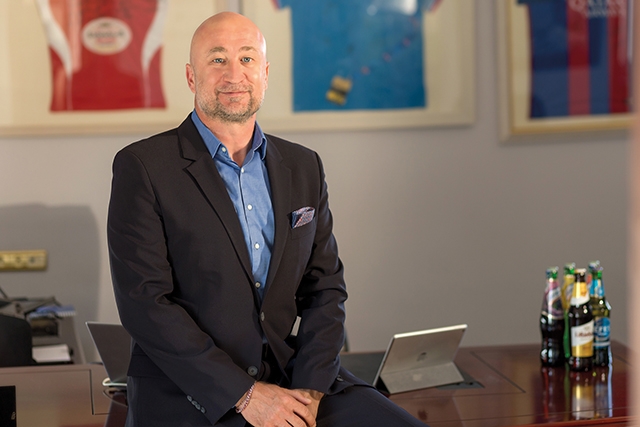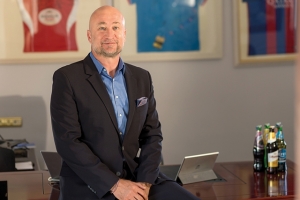Importance of Sustainable Development for Business & Customers
Interview
Efes Georgia entered the Georgian beer and CSD market in 2008, and it has steadily maintained its position as the leader of that market for the last 10 years. Efes Georgia is a part of Anadolu Group which is operating in 19 countries, with 66 production facilities in 9 sectors, and close to 80.000 employees. Most of the population of Georgia knows the company as the producer of a popular beer and lemonade called 'Natakhtari.' We decided to find out how the COVID-19 pandemic had affected Efes Georgia, and how the company sees its future: what are the prospects of business development and its role in the Georgian economy as a whole?
To discuss this, we spoke with Mr. Ertan Kurt, CEO of Efes Georgia, who has 25 years of experience working in strategic management in the FMCG sector. He has accumulated global experience in leading FMCG companies like Procter&Gamble, Nestle and Reckitt Benckiser, becoming head of Efes Georgia earlier this year, just two months before the coronavirus pandemic hit.
What measures have you taken to overcome the problems caused by the COVID-19 pandemic?
First of all, we identified three primary, clear priorities regarding the health and safety of our employees, consumers and business partners during the COVID-19 pandemic, in accordance with the recommendations and regulations of the World Health Organization and the Government of Georgia. These are:
1) Protecting the health and well-being of our employees;
2) Tightly monitoring health and safety norms in the production process;
3) Supporting Georgian society, our partners and employees.
In early March, those employees who did not need to work in the field or in production moved to remote working. The production process became automated to the greatest possible extent, without human participation. In addition, the company reduced working hours and travel areas for field groups. External visitors were prohibited from entering the factory and administrative offices. The complete disinfection of industrial equipment, workshops, manufactured products and vehicles took place on a daily basis, for which special mobile groups were set up. Remote thermal screening of all employees is still being conducted. Field workers, including distributors, were provided with gloves, masks, and hand sanitizers. In addition, informative posters regarding preventive measures against COVID 19 were placed in our brewery and other spaces, and special educational training was provided for the staff. These consistent measures minimized possible complications. During this period of remote work, we had several initiatives to improve communication with our employees and to keep their motivation high. I held remote 1to1 meetings with all the managers and supervisors to keep the personal touch and discuss all relevant business topics in detail. To keep the team spirit high and facilitate the information flow, we have regular Online Happy Hours and Online Town Hall Meetings.
Apart from COVID-19 prevention, in what way do you help society in terms of corporate responsibility?
Efes Georgia has been implementing projects in the field of corporate social responsibility since 2008. However, I think the pandemic represented another stage, a period of restart and responsible business development for our company. As for public support, we have been assisting the most vulnerable groups in the fight against COVID-19. And when the country needed to detect the virus quickly, we tried to contribute to this as well. In total, the company has spent more than 200 thousand GEL on the implementation of pandemic support projects under the auspices of its CSR program. We provided financial assistance for the STOPCOV Fund and a 2-month supply of disinfectants to the Infectious Diseases, AIDS and Clinical Immunology Research Center. We handed over rapid tests (SARS-CoV-2) to the government for preventive measures.
In addition, the Natakhtari Fund is supporting beneficiaries (such as adolescents without parental care) according to their individual needs and supports them with psychological consultation, rent, essential medicines, and resources required for remote learning. The company financed the fund’s beneficiaries who lost their jobs. Moreover, the company, in cooperation with the Georgian Bartender’s Association, its partner organization, provided financial assistance to bartenders. Around 500 bartenders who were left unemployed received supermarket vouchers. Efes Georgia also distributed free products to people over 70, families below the poverty line, employees of the government’s ‘Hotline 144’ Center, quarantined citizens, and our distinguished doctors.
I would like to highlight a part of our project we are especially proud of. We established the Natakhtari Fund almost 10 years ago and during COVID-19 period we increased our efforts there. The fund aims to both empower and take care of adolescents without parental care and prepare them for their independent life. Since 2011, the fund has helped up to 600 beneficiaries, more than 300 of whom gained employment, and more than 270 of whom received an education. These results were achieved through the unique methodology used by a project implemented by the NGO Association ‘Our Home Georgia.’ An individual development plan is created for each beneficiary, and the amount is allocated according to their specific needs. According to the goals of the fund, adolescents and young people receive care until their full independence. When a beneficiary above the age of 18 does not have a shelter and/or a job, the fund grants them a scholarship to cover rent, utilities and travel expenses. Since 2017, the Fund, in cooperation with the Coalition of Children and Youth Organizations, has been involved in a campaign to advocate for the needs of young people out of the public care system at both national and local levels.
Caring for the environment is one of the most important components of responsible business. What is Efes Georgia doing in this regard?
In 2012, we launched a wastewater treatment plant, which provides high-quality treatment of water resources used in the production process, and significantly reduces the impact on the environment. In addition, in 2014, we received an energy management system certificate ISO: 50001. The company regularly delivers environmental training, constantly conducting both internal and external environmental impact assessments.
Our investments in improving environmental standards and implementing an effective waste management system have borne fruit and, in 2018, we received a special CSR award in the field of environment protection, and our wastewater treatment system has become a showcase for the Georgian bottling industry. It was a good start and, in the following years, in terms of corporate responsibility, we received 3 different awards:
● Georgia’s Responsible Business Competition Meliora 2018 - ‘Cross-Sector Partnership – Shared Responsibility’ category
● CSR Award 2019 – ‘Partnership for Sustainable Development’ category
● ‘Partnership for Sustainability Award 2019’ - organized by UN Global Compact Ukraine.
What can you tell us about the competition. and the Georgian beer market in general?
The Georgian beer market has a substantially higher production capacity compared to consumer demand due to too many players, which is causing high competition. Efes Georgia is the clear market leader in the beer sector. High competition is good for customers because they get better quality, and more diverse products and services tailored to their needs from companies that are in a competitive struggle.
This year has been hard for everyone, and I think that companies need to spend more time thinking about how to benefit their customers. We listen to our consumers in order to understand what they need from specific brands. With that in mind, we launched the Natakhtari limited edition series, with special packaging inspired by Shota Rustaveli’s ‘The Knight in the Panther Skin’, Natakhtari with a thermochromic label, Karva Radler - the first beer mix in Georgia with lemon and lime, as well as Lowenbrau and Staropramen produced in Georgia. We have replaced imported products with locally produced ones, including licensed beers, over the last 15 years, turning imports into local production, which is very important for the country.
What is the export potential of the industry, and how is the country doing in this regard?
In general, the volume of beer exports to global markets is growing every year. Annually, Georgia exports over 4.7 million liters of beer. Currently, Efes Georgia beer and lemonade are being exported to 23 countries. The direction of exports in our company has been developing for years, both in terms of volume and number of markets, and is one of our highest priorities and most promising areas for business growth. We are going to increase investments in this direction and export Georgian products to more countries. We are going to intensify consumer communication in existing export countries to raise awareness of our brands, thereby strengthening our market position and awareness of Georgian brands in other countries. Bringing hard currency income to Georgia is a huge benefit for the country as well as our company.
We are prepared to work with the government to further grow Georgia’s exports and brand building in international markets. We have experiences from other countries and sectors which can be beneficial to prepare a long-term strategy.
Do you have any final messages for our readers?
I believe the government has done a great job putting people’s health as the biggest priority during these difficult times, and I trust we will overcome this period with solidarity. We believe in the potential of Georgia, and we will continue our investments to further increase our presence both in domestic and export markets. At Efes Georgia, we will keep our focus to improve communication both internally and externally, continue supporting a more agile culture and put innovation high on the agenda to better serve consumer needs.
By Mr. Ertan Kurt, Efes Georgia Managing Director











